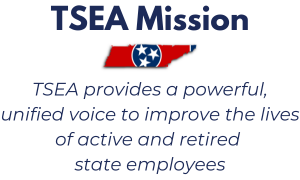The following article is republished in its entirety with permission as printed by Bolivar Bulletin Times:
Written by Amelia Carlson
Wednesday, October 03, 2012 8:09 PM
The Tennessee Excellence Accountability and Management (TEAM) Act, signed by Governor Bill Haslam on April 24, will soon begin to have an effect on state employees.
The changes, as opposed to what many have been told and believe, will not remove all state employees from civil service protection. The only employees who will not be protected against being fired without a cause are those positions who will be classified as ‘executive’ positions. Those positions will include employees who are appointed by the governor as well as positions such as physicians.
“Civil service just protected the employees from being fired without a cause,” said Dr. Philip Morson, President of the Tennessee State Employees Association (TSEA) and a long time Bolivar resident. “It is changing the name to ‘preferred service’ but those same protections of not being able to be fired without a cause are still in place. They will also essentially have the same grievance rights as before.”
The two primary differences employees will see and encounter are differences in performance evaluations and in the event of a layoff. The TEAM Act (HB 2384) will create a new form of performance evaluation for employees which is designed to be more objective.
“It has a lot more categories and requires a lot more meetings with supervisors,” said Morson. “Employees will meet with their supervisor at least once a month for what are being called ‘coaching sessions’. These meetings are supposed to provide guidance for the employee to know what they must do to obtain a higher score on the evaluation and create kind of a roadmap.”
The changes in the evaluations will also include a change in the way the evaluation is scored. The old system provided employees with the same 5 point scale that will be used in the new system. However, the old system provided employees with the ability to obtain a 4 on the evaluation if they were an “average” employee who came to work on time, did their job and did not have any problems. An employee would get a 3 if they needed to improve some things but may not be huge problems.
However, the new system provides the “average” employee will receive a 3 instead of a 4. The concern for employees will be the lack of a cushion area below the 3. If an employee gets a 2 then they are not eligible for a pay raise.
“If the evaluations are done correctly, they can be a good thing and beneficial thing,” said Morson. “That is, if the supervisors will actually meet with the employee and not type up something on the computer, hand it to them and tell them to sign it and then call it a monthly meeting.”
The new evaluation system, however, does not allow for consideration of the amount of caseloads or casework an employee may have. For example, if a caseworker from Western State Mental Health Hospital or the Department of Children’s Services leaves and that caseload is added to another caseworker, the new performance evaluation does not take into consideration the employee will be faced with doing twice as much work but expecting to still maintain a performance high enough for a 3 rating.
Another change employees will see affects how employees are considered during a time of a layoff. The TEAM Act initially took seniority completely out of the equation when it came to determining who would remain and who would be laid off.
“We (TSEA), with a lot of fights with the governor and legislators, got it to where seniority is now the second consideration. They wanted it out all together or to have it like the fifth consideration,” said Morson.
The TEAM Act and its effects on state employees appears more like the private sector than a government sector. Morson agrees and said the concept of privatization will not be beneficial to employees.
“Privatization is a dangerous thing,” said Morson. He said TSEA would continue to monitor the changes and their effectiveness with employees.
An additional change was made in regards to the hiring process of state employees.
“It does away with the hiring from the top 5 applicants scoring on the register from which applicants are selected. Under the TEAM Act, any applicant meeting the minimal qualifications for the position can be selected for the job,” said Morson. “If a hundred applicants are ‘qualified’ for the job, the state may select the 100th person. This is possibly the most important change, and the part on which the administration was most unwilling to compromise. Does it sound like cronyism and patronage are returning? You bet.”
The TEAM Act bill was supported by State Representatives Johnny Shaw and Barrett Rich. State Senator Dolores Gresham also voted in favor of the act.
Morson said he is unsure yet if the TEAM Act is a positive thing for state employees. “That (effectiveness of the changes being positive) remains to be seen. If it does improve it then it’ll be a miracle,” said Morson.













